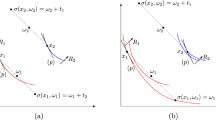Abstract
In this paper, we present a model of implementation where infeasible allocations are converted into feasible ones through a process of renegotiation that is represented by a reversion function. We describe the maximal set of Social Choice Correspondences that can be implemented in Nash Equilibrium in a class of reversion functions that punish agents for infeasibilities. This is used to study the implementation of the Walrasian Correspondence and several axiomatic solutions to problems of bargaining and taxation.
Similar content being viewed by others
References
Amorós P (2004) Nash implementation and uncertain renegotiation. Games Econ Behav 49: 424–434
Atlamaz M, Klaus B (2007) Manipulation via endowments in exchange markets with indivisible goods. Soc Choice Welf 28: 1–18
Benassy J-P (1975) Neokeynesian disequilibrium theory in a monetary economy. Rev Econ Stud 52: 503–524
Dagan N, Serrano R (1998) Invariance and randomness in the Nash program for coalitional games. Econ Lett 58: 43–49
Dagan N, Serrano R, Volij O (1999) Feasible implementation of taxation methods. Rev Econ Design 4: 57–72
Dréze J (1975) Existence of an exchange equilibrium under price rigidities. Int Econ Rev 16: 301–320
Grandmont JM, Laroque G (1976) On temporary Keynesian equilibria. Rev Econ Stud 43: 53–68
Hong L (1995) Nash implementation in production economies. Econ Theory 5: 401–417
Hong L (1996) Bayesian implementation in exchange economies with state dependent feasible sets and private information. Soc Choice Welf 13: 433–444
Hong L (1998) Feasible Bayesian implementation with state dependent feasible sets. J Econ Theory 80: 201–221
Hurwicz L, Maskin E, Postlewaite A (1995) Feasible Nash implementation of social choice rules when the designer does not know endowments or production set. In: Ledyard J (eds) The economics of informational decentralization: complexity, efficiency and stability. Kluwer Academic Publishing, Dordrecht, pp 367–433
Jackson M (2001) A crash course in implementation theory. Soc Choice Welf 18: 655–708
Jackson M, Palfrey T (2001) Voluntary implementation. J Econ Theory 98: 1–25
Maskin E (1999) Nash equilibrium and welfare optimality. Rev Econ Stud 66: 23–38
Maskin E, Moore J (1999) Implementation and renegotiation. Rev Econ Stud 66: 39–56
Moore J, Repullo R (1990) Nash implementation: a full characterization. Econometrica 58: 1083–1089
Naeve J (1999) Nash implementation of the Nash bargaining solution using intuitive message spaces. Econ Lett 62: 23–28
Postlewaite A (1979) Manipulation via endowments. Rev Econ Stud 46: 255–262
Repullo R (1987) A simple proof of Maskin’s theorem on Nash implementation. Soc Choice Welf 4: 39–41
Roemer JE (1996) Theories of distributive justice. Harvard University Press, Cambridge
Serrano R (1997) A comment on the Nash program and the theory of implementation. Econ Lett 55: 203–208
Serrano R, Vohra R (1997) Non cooperative implementation of the Core. Soc Choice Welf 14: 513–525
Silvestre J (1982) Fixprice analysis in exchange economies. J Econ Theory 26: 28–58
Tian G (1993) Implementing Lindahl allocations by a withholding Mechanism. J Math Econ 22: 163–179
Tian G, Li Q (1995) On Nash-implementation in the presence of withholding. Games Econ Behav 9: 222–233
Younès Y (1975) On the role of money in the process of exchange and the existence of a non-Walrasian equilibrium. Rev Econ Stud 42: 489–502
Author information
Authors and Affiliations
Corresponding author
Rights and permissions
About this article
Cite this article
Corchón, L., Triossi, M. Implementation with renegotiation when preferences and feasible sets are state dependent. Soc Choice Welf 36, 179–198 (2011). https://doi.org/10.1007/s00355-010-0470-9
Received:
Accepted:
Published:
Issue Date:
DOI: https://doi.org/10.1007/s00355-010-0470-9




